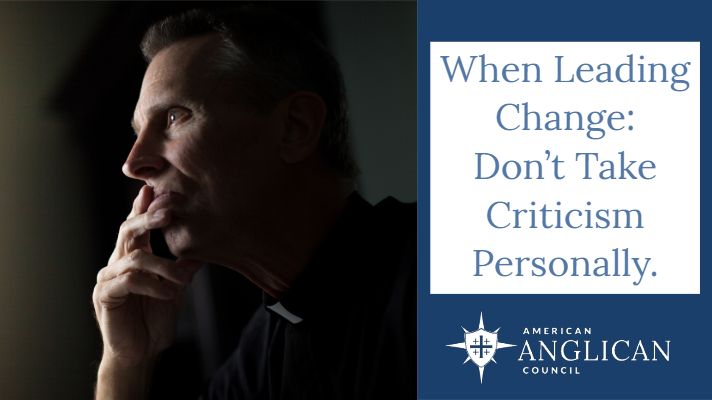Those of you who are or have been married will know that when your spouse comes to you upset about something, the presenting issue is often not the real issue. For example, if they are upset because you forgot to take out the garbage…again, the real issue is not the garbage. The real issue is something deeper like, “I don’t feel loved when you forget,” or “I feel disrespected when you don’t do what you say you will.” If you start fighting over the presenting issue, in this case the garbage, you’ll never resolve the real, underlying, source of the conflict – feeling unloved or disrespected. In marriage it’s a good habit to assume the presenting issue is not the real issue and try to figure out and address the deeper concern.
This same concept applies when leading change in a church. When you lead change there will be resistance which often comes in the form of criticism. The immediate temptation is to get defensive and react. But it is best to not take the criticism personally. A better habit is to assume that the presenting issue is not the real issue, pause, pray, and try to figure out and address the deeper concern.
An example might be that you are going to start a contemporary worship service to bring in a different group of unchurched people from your community, hoping the church will grow. Even though you are making no changes to the existing worship service and you’re not asking people to stop attending that service they enjoy, you find some are complaining. They might criticize you saying something like, “Father So and So isn’t being a real Anglican anymore!” And by “real Anglican” they mean the way they’ve always done it! The temptation in this case would be to take it personally and defend your Anglican credentials.
However, remembering that the presenting issue is not usually the real issue, it is better to try to figure out what they are really concerned about and address that issue. Especially when it comes to changes that will lead to growth in the church, there are three common causes of criticism that are often below the surface for people. This isn’t by any means an exhaustive list of the “real reasons” people complain but they are a good place to start looking into. If you can learn to recognize these in people and address them it will help you better navigate through your leading of change.
Three Common Causes of Criticism:
- Care: The real issue here is a fear that their need to be cared for won’t be met anymore due to the change. Some fear that the clergy or leadership will not care about me as they try to bring in new people. I had people come into my office upset that I seemed to care more about the new people or unchurched people than I did them. In my early years of revitalization, I would respond with something like, “Well I know you’ll be in Heaven when you die but I’m not so sure about them so yeah, I kind of do care more about them.” That didn’t go over well! Later, I realized that many weren’t necessarily against growth or change or even the Great Commission but rather they were concerned about being cared for. Their deeper issue was that if we brought in these new people as a result of the change, then they wouldn’t receive the care they wanted from the clergy/church anymore. Through preaching and teaching and personal conversations I reassured existing members that I/we did care. However, since not growing wasn’t an option and yes, growth will mean I couldn’t provide all the care, I would make sure I provided for their care in other ways like with small groups, it went better!
- Control: The real issue here is that growth will mean that some people won’t be as involved as they once were, causing them to lose a sense of control. Some will resist change and become critical because they don’t want to lose their “power” in some area of the church. Growth does upset the balance of power between “old-timers” and “new-comers.” This is where having a compelling and clear vision for fulfilling the Great Commission is so important. God commands we go and reach lost people. Love demands that we go and reach lost people. Helping people see beyond their own selfish need to control and reassuring them that they can still have significance in the church as it grows is essential.
- Comfort: Remember, there is no growth without pain. Change means loss and loss means pain. Therefore, many will be critical of you when you lead change because they want to avoid pain. They are comfortable with the way things are even if the church is declining. They don’t want to lose what they know and love. As Christians, we must be willing to minister outside of our comfort zones as Jesus did. Remember his prayer in the garden? He prayed, “Father, if you are willing, take this cup from me; yet not my will, but yours be done.” It certainly would have been more comfortable to not die on a cross! Of course, God is not calling any of us to die on a cross but he does call us to sacrifice our comfort sometimes for the sake of others. To choose personal comfort over doing whatever it takes bring lost people into God’s Kingdom in the local church is like saying to people, “You can go to Hell.” Now, good proper Anglicans would never say that to someone, but what’s the difference if you place your comfort over their salvation?
The real issue here in all these sources of criticism is: Selfishness. All three of these common causes of criticism are rooted in immaturity in Christ. All three can be addressed by helping church members become mature in Christ. If someone’s relationship with Jesus is such where their primary source of care, security come from him and not the church or a priest, they will be far more open to the church changing. It the church changes, they are still okay because Jesus hasn’t changed. And if they recognize he is king and in control of his church and not them they will be far more likely not to try to control it and be more open to change.
As you lead change, try to look for and help people address these deeper concerns and may all of us continually grow in maturity in Christ for the sake of the church growing and God’s Kingdom expanding.



